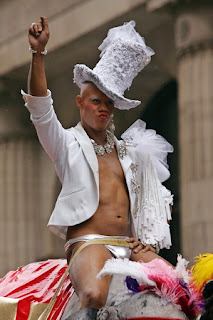Anti-gay Hate Crimes Widespread
Source: UC Davis News & Information
Nearly four in 10 gay men and about one in eight lesbians and bisexuals in the United States have been the target of violence or a property crime because of their sexual orientation, according to a new study by University of California, Davis, psychology professor Gregory Herek.
"This is the most reliable estimate to date of the prevalence of anti-gay victimization in the United States," Herek said. "The data demonstrate that crimes against sexual minority adults, especially gay men, are disturbingly widespread."
Herek's findings were based on a survey he conducted in the fall of 2005 with a nationally representative sample of 662 self-identified gay men, lesbians and bisexuals. The study will be published in a future issue of the Journal of Interpersonal Violence.
Overall, 21 percent of the people in the survey reported being the victim of violence or a property crime -- including physical assault, sexual assault, theft and vandalism -- because of their sexual orientation. In addition, 49 percent said they had been verbally abused because of their sexual orientation, 23 percent reported being threatened with violence, 12.5 percent reported having objects thrown at them, and 11 percent reported housing or job discrimination. The total exceeds 100 percent because some individuals reported being the target of multiple attacks.
"These data highlight the continuing need for criminal justice programs to prevent and deter anti-gay crimes, as well as the need for victim services that will help to alleviate the physical, economic, social and psychological consequences of such crimes," Herek said.
The study found significantly different rates of victimization among gay men, lesbians and bisexuals. More than a third of the gay men said they had experienced violence or property crime because of their sexual orientation, or about three times the proportion of lesbians and bisexuals. Gay men also reported the highest rates of harassment and verbal abuse. And gay men and lesbians reported two to four times more housing and job discrimination than bisexuals. The disparities persisted after Herek controlled statistically for age, race, ethnicity and education.
"Men are generally more likely than women to be the targets of most kinds of violent crime, and this pattern seems to hold in anti-gay hate crimes as well," Herek said. "The gay men and lesbians in the study were much more likely than the bisexual men and women to be open about their sexual orientation. Their greater visibility probably also makes them easier targets for discrimination than bisexuals."
Survey respondents were randomly selected from a panel of more than 40,000 U.S. households maintained by Knowledge Networks, a survey research firm. The firm recruits panel members via standard telephone sampling methods; in return for regularly completing online surveys, the panel members receive free Internet equipment and access.
Previous studies of anti-gay hate crimes have relied on samples that were smaller or not representative of the U.S. population, Herek reported.
In the new study, survey respondents had an average age of 39. Most had attended some college. Two thirds were white, 16 percent black and 12.5 percent Hispanic.
Data collection for the study was supported by a grant from the Gill Foundation, a Denver-based organization that supports equal opportunities for people regardless of sexual orientation or gender expression.
Media contact(s):
• Gregory Herek, Psychology, (530) 752-8085, gmherek@ucdavis.edu
• Claudia Morain, UC Davis News Service, (530) 752-9841, cmmorain@ucdavis.edu






